Are you considering how to ship from China to England efficiently? Navigating the complexities of international shipping can be daunting, but understanding the right methods and processes can make all the difference. In this comprehensive guide, we’ll explore the various shipping options, including sea freight and air freight, to help you make informed decisions. From understanding customs regulations to selecting the ideal freight forwarder, this blog will equip you with the essential knowledge for a successful shipping experience.

Understanding the Shipping Landscape: China to England
Overview of Importing Goods from China
Importing goods from China to England has become a vital part of global trade, with China being one of the largest exporters in the world. According to data from Statista, in 2023, the total value of goods exported from China to the United Kingdom was approximately £80.8 billion. This booming trade emphasizes the need for efficient shipping solutions that cater to the diverse needs of businesses looking to source products from China.
When considering the logistics of importing, one must focus on several critical factors, including product type, urgency, and budget. Importing from China offers access to a wide range of products, from electronics to textiles. However, navigating the complexities of international shipping and customs regulations is essential to ensure a smooth import process.
Importance of Choosing the Right Shipping Method
The choice of shipping method significantly impacts the overall efficiency of the logistics process. Selecting the appropriate shipping solution can affect costs, delivery times, and the condition of goods upon arrival. Two primary shipping methods from China to England are sea freight and air freight.
Sea Freight: This method is generally more cost-effective for large shipments. However, it usually has longer transit times compared to air freight. Businesses that are not time-sensitive or are shipping bulky items often prefer this mode due to its lower costs. For detailed pricing, check out how much is ocean freight from china.
Air Freight: This method is ideal for urgent shipments and smaller volumes due to its speed. Although the costs are higher than sea freight, the benefits of quicker delivery times can outweigh the additional expenses, especially for high-value or perishable goods. For more information on air shipping rates, see air freight from china to uk.
Understanding the specific needs of your shipment is crucial in determining the most suitable shipping method, ensuring that you balance cost and time effectively.
Key Shipping Methods from China to England
Sea Freight: Cost-Effective Solutions
Shipping by sea freight remains one of the most popular methods for transporting goods from China to England. It is particularly advantageous for businesses looking to import large quantities of goods.
Full Container Load (FCL) vs. Less than Container Load (LCL)
When opting for sea freight, you have two primary choices:
| Shipping Mode | Description | Best For | Cost |
|---|---|---|---|
| Full Container Load (FCL) | A dedicated container for your goods, typically 20ft or 40ft. | Businesses shipping large volumes. | Lower cost per unit when sending full containers. |
| Less than Container Load (LCL) | Sharing a container with other shipments. | Smaller shipments that do not fill a container. | Higher cost per unit, but more affordable for small quantities. |
Choosing between FCL and LCL depends on your shipment’s size and budget.
Estimated Delivery Times for Sea Freight
The estimated delivery times for sea freight from China to England usually range from 25 to 40 days, depending on the departure port and destination within England. Key ports to consider include Shanghai, Shenzhen, and Ningbo for departure, with potential arrival ports such as London, Liverpool, and Southampton.
Air Freight: Fast and Reliable Options
Air freight is recognized for its speed and reliability, making it an attractive choice for urgent shipments. This method is ideal for high-value or perishable items where time is of the essence.
Benefits of Air Shipping
- Speed: Air freight significantly reduces transit times, with most shipments arriving within 3 to 7 days.
- Reliability: Airlines maintain strict schedules, providing predictable delivery timelines.
- Security: Air cargo is often subject to rigorous security checks, ensuring the safety of goods in transit.
Typical Costs and Delivery Times
While the costs associated with air freight tend to be higher than those for sea freight, the benefits for time-sensitive shipments can justify the expenditure. The average cost for shipping a standard air freight shipment from China to England can range from £5 to £10 per kilogram, depending on factors such as weight, dimensions, and airline policies. It is advisable to consult with a professional freight forwarder, like Dantful International Logistics, to obtain tailored quotes and expert guidance.
In summary, understanding the shipping landscape and comparing the available methods is essential for making informed decisions regarding imports from China to England. Whether you choose sea freight for its cost-effectiveness or air freight for its speed, Dantful International Logistics can facilitate a seamless shipping experience, ensuring your goods arrive safely and on time.
Read More:
- Shipping From China To Netherlands
- Shipping From China To Spain
- Shipping From China To Germany
- Shipping From China To France
- Shipping From China to Italy
- Shipping From China To Poland
- Shipping From China to United Kingdom
The Shipping Process Explained
Step-by-Step Guide to Shipping from China to England
Shipping goods from China to England involves several critical steps that must be followed to ensure a smooth and successful delivery. Here’s a detailed step-by-step guide:
Select a Freight Forwarder: The first step in the shipping process is to choose a reliable freight forwarder. At Dantful International Logistics, we offer professional and cost-effective services tailored to your needs. A good freight forwarder will navigate the complexities of international shipping, ensuring your goods arrive safely and on time.
Determine Shipping Method: Decide on the best shipping method based on your budget and timelines. As previously discussed, sea freight is typically more cost-effective for larger shipments, while air freight is faster for smaller loads.
Get a Quote: Request quotes from your chosen freight forwarder. This will typically include shipping costs, handling fees, and any additional services like customs clearance.
Prepare Goods for Shipping: Ensure that your products are well-packaged and labeled correctly. This is crucial for preventing damage during transit and facilitating smooth customs clearance.
Book Your Shipment: Once you have finalized the details, book your shipment through your freight forwarder. They will handle the logistics, including picking up the goods from the supplier in China.
Documentation: Prepare all necessary documentation, such as the commercial invoice, packing list, and bill of lading. Your freight forwarder will assist with this to ensure compliance with both Chinese and UK regulations.
Customs Clearance: Upon arrival in England, your goods will go through customs. Make sure to have all paperwork ready. Your freight forwarder can help manage this process, minimizing delays.
Delivery: After clearing customs, arrange for the delivery of your goods to the desired location in England. You can opt for door-to-door shipping services for convenience.
Tracking Your Shipment: Tools and Techniques
Tracking your shipment is an essential part of the shipping process. Here are some effective tools and techniques to keep you informed:
Online Tracking Systems: Most freight forwarders, including Dantful International Logistics, provide online tracking systems. You can enter your tracking number to monitor the status of your shipment in real-time.
Mobile Apps: Some freight forwarding services offer mobile applications that provide updates and notifications about your shipment’s progress directly to your smartphone.
Direct Communication: Maintain open communication with your freight forwarder. They can provide timely updates, especially if any unexpected issues arise during transit.
GPS Tracking: For high-value shipments, consider using GPS tracking devices. This allows you to monitor the location of your goods throughout the journey.
Cost Considerations When Shipping from China to England
Breakdown of Shipping Costs by Method
Understanding the cost structure is vital when planning to ship from China to England. Here’s a breakdown of the costs associated with various shipping methods:
| Shipping Method | Estimated Cost (per kg) | Estimated Delivery Time | Additional Considerations |
|---|---|---|---|
| Sea Freight (FCL) | $1.00 – $1.50 | 20-30 days | Best for large volumes. |
| Sea Freight (LCL) | $1.50 – $2.50 | 30-45 days | Cost-effective for smaller shipments. |
| Air Freight | $5.00 – $10.00 | 5-10 days | Ideal for urgent shipments but more expensive. |
| Rail Freight | $2.00 – $4.00 | 15-25 days | A good compromise between cost and time. |
Note: Prices may vary based on specific routes, seasonality, and the current market conditions. Always consult with your freight forwarder for the most accurate pricing.
Factors Influencing Shipping Rates
Several factors can influence shipping rates when transporting goods from China to England:
Shipping Volume: Larger shipments often benefit from lower per-unit costs, especially with Full Container Load (FCL) shipping.
Weight: The weight of your shipment significantly affects the overall cost, particularly for air freight.
Fuel Prices: Fluctuations in fuel prices can impact shipping costs, especially for sea and air freight services.
Customs Duties and Taxes: Import duties and taxes imposed by the UK government can add to your total shipping expenses, making it crucial to understand these costs beforehand.
Seasonality: Shipping rates can vary during peak seasons (e.g., holidays), so planning your shipment ahead of time can help mitigate costs.
Additional Services: Any extra services provided by your freight forwarder, such as insurance, warehousing, or special handling, will also affect the overall price.
By being aware of these factors, you can better plan your shipping strategy and budget for your imports from China to England. Dantful International Logistics is committed to providing transparent pricing and expert advice to help you navigate these considerations efficiently.
Navigating Customs Regulations in the UK
Understanding Import Duties and Taxes
When shipping goods from China to England, understanding the intricacies of import duties and taxes is crucial for smooth transactions. The UK imposes various duties and taxes on imported goods, primarily governed by the Customs Tariff. The import duty rate can vary significantly based on the type of goods being imported, their value, and their country of origin.
For instance, goods imported from China may be subject to a duty rate ranging from 0% to over 20%, depending on the HS code classification. Additionally, all imports are subject to Value Added Tax (VAT), which is currently set at 20% in the UK. This tax is calculated based on the total value of the goods, including the cost of shipping and any applicable import duties.
To estimate duties and taxes accurately, importers can utilize online calculators or consult with their freight forwarder, such as Dantful International Logistics, who can provide up-to-date information on current rates and regulations. This understanding helps in budgeting and avoiding unexpected expenses upon the arrival of goods.
Essential Documentation for Smooth Customs Clearance
Successful customs clearance is contingent upon the accurate preparation and submission of essential documents. Here are the key documents required when shipping from China to England:
- Commercial Invoice: This document outlines the transaction details, including descriptions of the goods, their value, and the terms of sale.
- Packing List: It details the contents of the shipment, including weight, dimensions, and packaging specifications.
- Bill of Lading (BOL): This is a contract between the shipper and carrier detailing the transportation of goods. It serves as proof of ownership and receipt of the goods.
- Import Declaration: Required by UK customs, this form provides detailed information about the shipment, including the nature of the goods and their value.
- Certificate of Origin: Some goods may require this document to prove their origin, which can affect duty rates.
- Additional Permits: Depending on the nature of the goods (e.g., food, chemicals), certain additional permits or certificates may be necessary.
Having these documents prepared correctly and ensuring they comply with UK regulations will facilitate a smoother customs process, thus reducing the risk of delays or penalties. For further information on customs clearance, check out our guide on Customs Clearance.
Tips for Successful Shipping from China to England
Choosing the Right Freight Forwarder
Selecting a reliable freight forwarder is pivotal to the success of your shipping operations. A proficient freight forwarder, like Dantful International Logistics, offers a comprehensive range of services that can simplify the complexities associated with shipping from China to England. Here are some tips for choosing the right partner:
- Experience and Expertise: Look for a forwarder with extensive experience in handling shipments from China to the UK and familiarity with customs regulations.
- Cost-Effectiveness: Compare quotes from various forwarders, but ensure you consider the quality of service as well.
- Services Offered: Ensure that the forwarder provides a full suite of services, including ocean freight, air freight, customs clearance, and insurance.
- Customer Service: A responsive and helpful customer service team can greatly assist in resolving any issues that may arise during the shipping process.
- Technology Utilization: A forwarder that offers tracking tools and advanced technology can provide better visibility throughout the shipping process.
Best Practices for Packaging and Labeling Goods
Proper packaging and labeling are essential to ensure that your goods arrive in England safely and comply with regulations. Here are some best practices:
- Use Strong Packaging Materials: Select high-quality boxes and packing materials that can withstand the rigors of transportation.
- Label Clearly: Ensure that each package is labeled with the correct shipping address, return address, and any necessary handling instructions (e.g., “Fragile,” “Keep Dry”).
- Include Necessary Documentation: Place copies of essential documents (like invoices and packing lists) inside the package and ensure they are readily accessible.
- Adhere to Weight Limits: Be aware of weight limits imposed by shipping carriers to avoid additional charges.
- Consider Environmental Factors: If shipping sensitive items, consider how temperature and humidity may affect them and package accordingly.
By adhering to these guidelines, you can enhance the chances of a successful and efficient shipping experience from China to England.

Young Chiu is a seasoned logistics expert with over 15 years of experience in international freight forwarding and supply chain management. As CEO of Dantful International Logistics, Young is dedicated to providing valuable insights and practical advice to businesses navigating the complexities of global shipping.





















 Afrikaans
Afrikaans Shqip
Shqip አማርኛ
አማርኛ العربية
العربية Հայերեն
Հայերեն Azərbaycan dili
Azərbaycan dili Euskara
Euskara Беларуская мова
Беларуская мова বাংলা
বাংলা Bosanski
Bosanski Български
Български Català
Català Cebuano
Cebuano Chichewa
Chichewa 简体中文
简体中文 繁體中文
繁體中文 Corsu
Corsu Hrvatski
Hrvatski Čeština
Čeština Dansk
Dansk Nederlands
Nederlands English
English Esperanto
Esperanto Eesti
Eesti Filipino
Filipino Suomi
Suomi Français
Français Galego
Galego ქართული
ქართული Deutsch
Deutsch Ελληνικά
Ελληνικά Kreyol ayisyen
Kreyol ayisyen Harshen Hausa
Harshen Hausa Ōlelo Hawaiʻi
Ōlelo Hawaiʻi עִבְרִית
עִבְרִית हिन्दी
हिन्दी Hmong
Hmong Magyar
Magyar Íslenska
Íslenska Igbo
Igbo Bahasa Indonesia
Bahasa Indonesia Gaeilge
Gaeilge Italiano
Italiano 日本語
日本語 Basa Jawa
Basa Jawa ಕನ್ನಡ
ಕನ್ನಡ Қазақ тілі
Қазақ тілі ភាសាខ្មែរ
ភាសាខ្មែរ 한국어
한국어 كوردی
كوردی Кыргызча
Кыргызча ພາສາລາວ
ພາສາລາວ Latin
Latin Latviešu valoda
Latviešu valoda Lietuvių kalba
Lietuvių kalba Lëtzebuergesch
Lëtzebuergesch Македонски јазик
Македонски јазик Malagasy
Malagasy Bahasa Melayu
Bahasa Melayu മലയാളം
മലയാളം Maltese
Maltese Te Reo Māori
Te Reo Māori मराठी
मराठी Монгол
Монгол ဗမာစာ
ဗမာစာ नेपाली
नेपाली Norsk bokmål
Norsk bokmål پښتو
پښتو فارسی
فارسی Polski
Polski Português
Português ਪੰਜਾਬੀ
ਪੰਜਾਬੀ Română
Română Русский
Русский Samoan
Samoan Gàidhlig
Gàidhlig Српски језик
Српски језик Sesotho
Sesotho Shona
Shona سنڌي
سنڌي සිංහල
සිංහල Slovenčina
Slovenčina Slovenščina
Slovenščina Afsoomaali
Afsoomaali Español
Español Basa Sunda
Basa Sunda Kiswahili
Kiswahili Svenska
Svenska Тоҷикӣ
Тоҷикӣ தமிழ்
தமிழ் తెలుగు
తెలుగు ไทย
ไทย Türkçe
Türkçe Українська
Українська اردو
اردو O‘zbekcha
O‘zbekcha Tiếng Việt
Tiếng Việt Cymraeg
Cymraeg יידיש
יידיש Yorùbá
Yorùbá Zulu
Zulu